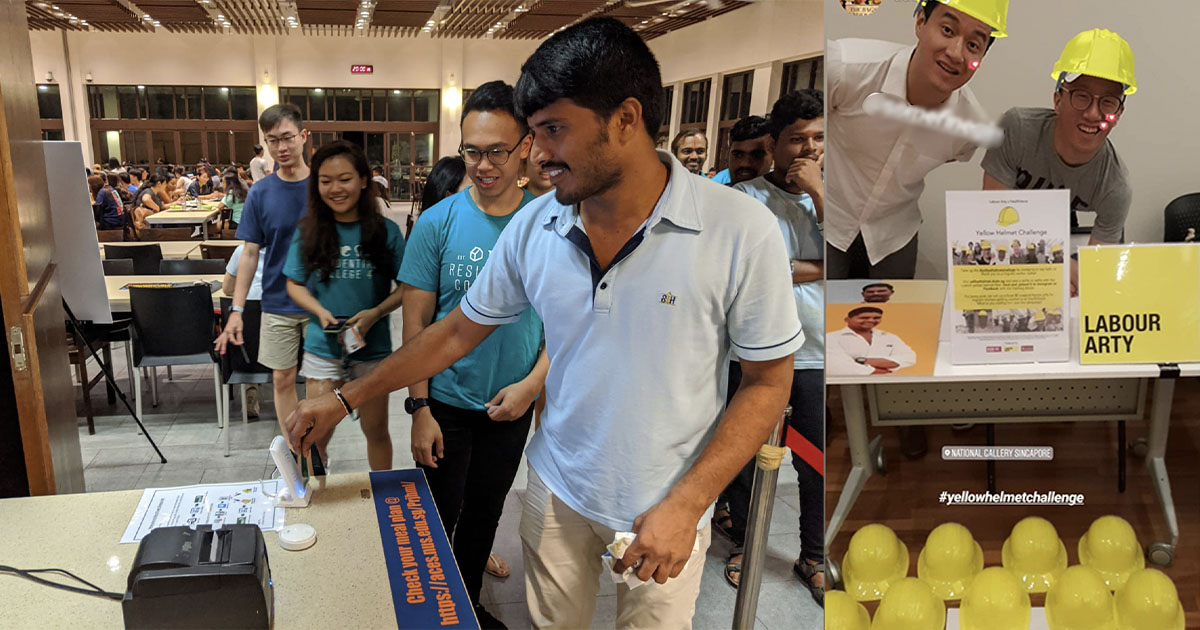‘Made in China’, but Singaporean.
For 30-year-old Ou Ningfei, who migrated to Singapore with his family when he was 7, this puts him in a spot where he was, in a way, stuck between two cultures.
Being a foreigner meant being an ‘outsider’ in a land foreign to him, and some of the things he experienced back then include being treated with prejudice, or “they would start to interact with you lesser because they see that you’re from another place.”
Such ostracising and marginalising behaviours towards migrants are ubiquitous, but it is also exactly that that often makes our society forget empathy.
Fortunately, those experiences only pushed Ningfei to pick up on the nuances of the local culture more quickly. And today, his identity as Singaporean is no less than any other born-and-bred locals, for he has spent almost this entire life here and also fulfilled the service of every Singaporean son.
However, for many other immigrants who come to Singapore in search for better livelihoods, the privilege of being accepted by society may not exist.
Marginalisation in the Migrant Worker Space
Besides personal experiences, Ningfei also had his share of interaction with migrants and the hardship that they face. His parents were migrant workers themselves and his mother, a regular volunteer at church events that support migrant workers.
“I’ve seen the spaces that [migrant workers] occupy, the issues that they face, physically and socially. And many times, they get exploited in so many ways.”
Migrant workers lack privilege and power of influence in a foreign society, making them more susceptible to being taken advantage of by errant employers.
“There are so many stories that are so hard to hear, so painful,” Ningfei added, as he shared about migrant workers who end up with injuries or even permanent impairment caused by their work, as well as the exorbitant agent fees and low salaries.
In an interview with another publication, Ningfei shared that some workers pay “as much as $3,000 SGD to $15,000 SGD to their agents in home countries like India and Bangladesh.”
Once, at a gathering he and his mother were helping out at, Ningfei met a Chinese migrant worker who was forced to do OT for 2 weeks straight without remuneration. Seeing that the worker had come at almost 10pm to collect the packet of Cai Png for dinner, Ningfei spoke to him to understand why.
Describing the grease, grime, and blisters that marked the worker’s arms and hands, Ningfei recalled, “You can tell how hungry and tired he was. He was crying and telling me how he hasn’t gone home for a long time. And I realised how even though we were around the same age, we lead such different lives.”
“You look at people like him, and you know that there’s really a lot of things you can do for the underprivileged.”
Labouring for Migrant Workers
After having helped out at many welfare support events for migrant workers together with his mother, Ningfei decided to do more on his own.
In 2018, he started Labour Arty, a ground-up initiative that leverages various mediums like photography and digital media to promote appreciation and awareness for migrant workers in Singapore.
“The genesis of this is that I’m Singaporean but I’m from China. My parents are migrants themselves, which is why my heart goes to migrant workers.”
With the support of friends, Labour Arty shot and launched their first project: A humble photography exhibition titled Blind Spots. It captured a sight familiar to all of us but often go unnoticed.
Migrant workers being transported at the back of lorries like ‘human cargo’.
Since then, Labour Arty have gone on to launch several projects. These include the Tap4You project, which encouraged NUS students to share a meal with migrant workers, as well as the Yellow Helmet Challenge, one of their earlier works, which aimed at increasing the visibility of and appreciation for migrant workers.
Just recently over Chinese New Year, they also partnered with sponsors like Impossible Foods and Dumpling Darlings to organise a Dumpling Party for migrant workers who were affected by the travel restrictions arising from the COVID-19 situation.
Besides championing for the migrant workers, Labour Arty’s work is also a subtle approach at increasing social harmony in a community. This is especially important in Singapore, as our society is such a diverse conglomeration of different nationalities, races, and cultures.
“We try to change the perspectives people have of migrant workers. By increasing awareness amongst those who aren’t aware, and by making those who are aware be more ready to stand up, so that [migrant workers] don’t get exploited.”
Running An Initiative As An Individual
However, juggling full-time work and personal commitments on top of running a ground-up initiative comes with its share of challenges of course. For example, the lack of resources to do more.
Although Labour Arty has been fortunate to receive support from various parties and organisations including the National Volunteer and Philanthropy Centre, it is fully run by Ningfei and a team of like-minded friends on a volunteer-basis.
A full-time product and process manager himself, Ningfei explains the constraints they face in championing for change.
“It’s fun for friends to help out for one or two projects, but it’s tough to sustain an entire movement.”
However, the mission has always been very clear to him: Every little bit helps.
Citing several similar movements and initiatives like Migrant x Me and Sama Sama, he spoke about the inspiration he draws from them, as well as the sense of camaraderie in working towards a common cause.
He also emphasised the importance of collaboration and finding the right partners in achieving the mission, “good partners can give you support and help you spread the work you do.”
Do Something Close To Your Heart
Besides Labour Arty, Ningfei also co-founded another groundup last year. Aptly named codeToLove, the initiative helps other non-profits with their IT needs.
In some ways, codeToLove is also a passion project and one that allows him to help amplify the good that others do while practicing what he likes (designing and writing digital/UX content).
“If I am to be labouring, it better be for good, and to have some fun out of it,” he explains.
“If it’s purely meaningful but not fun, it’s going to be miserable. But if it’s fun but not meaningful, then it’s not going to mean much at the end of the day.”
And yes, at the end of the day, Ningfei’s motivation is something that many of us can relate to, which is a desire to derive meaning and enjoyment out of what we do. It can come from your job, or it can come from starting your own groundup, but what he said will ring in our ears for a long time to come: “Do something that’s close to your heart.
–
Start Your Own Groundup With Groundup Central!
Passionate about a social issue and wish to make a change, or keen to contribute towards a certain cause? Check out how you can get support from Groundup Central here!
(This article was written in collaboration with the National Volunteer & Philanthropy Centre.)
(All images credit: Ou Ningfei and Labour Arty)
 Image Credit: <a href="
Image Credit: <a href="
WHAT'S HIKIKOMORI?
For the uninitiated, hikikomori is a term used to describe those who rarely leave their house, and seek extreme degrees of isolation. Some never set foot outside their homes. Others occasionally do, heading out to buy food or even to the cinemas for the latest blockbuster, but all of them are completely, socially isolated. They would even limit their interaction with their own family members. Although this social phenomenon is predominantly widespread in Japan, I recently stumbled upon a Reddit thread that tells me that we too, have our share of social recluses hidden in their rooms somewhere, unseen by society. Through a local forum, I stumbled upon Andrea’s story. Back then, Andrea cooped herself up at home for eight consecutive months. Waking up at five every morning, she spends her time browsing Reddit, reading and binging on TV series, only leaving her room for lunch and dinner, which her parents would prepare for her. At around 11 pm, she will head to bed and the same routine repeats for months, and in those months, she did not step out of her house once.Her home had become a place of solace for her, a fortress she can’t bear to leave.Likewise, this is the case for the many hikikomori in Singapore, who have taken to forums to pour the feelings that they have hidden away from their friends and family.
WHY DO THEY ADOPT THE HIKIKOMORI LIFESTYLE?
Hailing from a ‘financially comfortable’ background, Andrea is aware that she is more fortunate than most, as she could afford the option of not having to work or fend for herself. But because of that, she feels more pressured to pay her parents back for all that they have done for her. The low self-esteem, crippling social anxiety, and negative outlook on life that came from her being bullied in school when she was younger kept her imprisoned. The self-imposed pressure and the expectations about the future stressed her out and caused her to feel even more helpless. When she finally entered the workforce, work became her life. All she did was wake up, go to work, head home to have dinner with her parents, and repeat. Due to her micromanaging boss, she grew to resent work. Even so, she continued working for some years to save up a sum of money before eventually resigning, dampened by the rat race. “So after that, I didn’t really have a plan. I just stayed home. Months quickly turned into years. And because I was used to a solitary lifestyle of just reading and watching drama and anime, I just shut myself off from society and basically became hikikomori, just living off my parents and my savings.”ONLY FOR THE PRIVILEGED?
Of course, not everyone is privileged enough to be able to just drop everything and withdraw from society in the first place — most of us are not as financially blessed. Through r/hikikomori, I was able to speak to another Singaporean hikikomori, 24-year-old Josh*, who shared how he was once a hikikomori. Like Andrea, Josh comes from a financially stable family.“Maybe we were too sheltered. Maybe we were too spoiled and everything comes to us easy and without any barriers. Back then, I felt that no matter how useless I was, I would still be able to live comfortably, or still be able to live somehow.”An avid fan of Disney’s classics, Josh had a grandiose dream of being a 2D Animator for Disney. When news broke that Disney closed down their 2D animation company, his hopes and dreams were dashed. Dejected, he let himself waste away, passing the days by gaming and watching anime at home.
WHAT'S THE CAUSE FOR THIS?
For many of us, such behaviour is aberrant and tough to comprehend, much less empathise with. It’s not surprising for us to jump on the conclusion that hikikomori chose to stay cooped up at home because they are just “lazy” and “spoiled”. “We all have problems, so why can’t they just do something about their problems?” But unlike what we think, the hikikomori syndrome is not another convenient excuse to be idle.In fact, most, if not all, hikikomori hate the plight that they put themselves in, and they are ashamed of it.“When I was hikikomori, I lost all desire for wants. Normal things like going to movies or buying expensive new things don’t interest me anymore. I don’t know why I exist, to be honest. Sometimes I can feel my parents’ disappointment in me and I don’t feel good too,” shares Andrea. They have confined themselves to their homes, but most hikikomori actually want to return to society. However, the fear and anxiety of how society may react to them. Even if they manage to take the first step out of their homes, they are plagued by this constant fear that they are being judged by those around them, afraid that the world wouldn’t come to accept them because of their past. Maika Elan, a Photographer exploring the topic of hikikomori, shared on National Geographic that “Over time, hikikomori lose whatever self-esteem and confidence they had, and the prospect of leaving home becomes ever more terrifying. Locking themselves in their room makes them feel ‘safe’.” Similarly, Andrea admitted that the very paranoia of being judged for being a hikikomori is the toughest obstacle she had to overcome. She would often slip back into isolation because of it. Thanks to volunteer work at a church, Andrea was able to break out of the hikikomori syndrome. She eventually managed to land herself a job through one of the other volunteers. As for Josh, he stumbled upon the animes Re:Zero and Konosuba, which shifted his perspective on life. Both shows feature male protagonists who were hikikomori and Josh was able to relate to them strongly. “In Re:Zero, it tells us that no matter where you are, nothing’s going to change if you don’t put in any effort to take charge and improve yourself.” Witnessing his friends’ success also pushed him to eventually change his lifestyle.
“What gives them the drive to keep doing what they do? Why are they set on improving themselves and going out there to find jobs and socialise, and to be proactive with their lives?”These were the questions that Josh posed to himself, and subsequently embarked on a quest to uncover. “Sometimes it’s hard, but you just have to remember that there are other people out there who are struggling and still trying their best as well.” Today, he works as a Digital Designer, which is not too far off from his initial dream. Although, there are others who struggle to break out. “It all started after he finished his degree overseas and came back. He didn’t find work and just stayed at home gaming and surfing the net. We’d ask him to come out for coffee or meals but he’d always turn us down.” Tim*, a male in his 30s, shares with me about his friend who has been a hikikomori for over 10 years. “I’ve a feeling that the shame of being long unemployed while everyone else is working just drives him to become a hikikomori. I guess his parents still buy him food or give him spending money so he doesn’t need to force himself to get a job.”
A VICIOUS CYCLE OF FEAR AND PARANOIA
Although hikikomori is a social condition that has not been widely recognised as a mental illness, many of them do require mental health care. Some turn to this reclusive lifestyle due to a lack of purpose or existential crisis while others do so as a form of rebellion to cope with trauma such as childhood abuse or bullying. While hikikomori wish to recover, they are so ashamed of their past that it freezes them up, causing them to retreat back into their shelter. However, the longer they isolate themselves from society, the harder it will be to integrate back into it. It’s a vicious cycle that they are dealing with. For such people who haven’t interacted with anyone nor formed any ‘proper’ relationships, it could be tougher for them to reintegrate into society as they grow older, especially if their family members (like their parents) are no longer around to support them. In Japan, this has become a real problem. These days, it’s an absolute nightmare if we were to be void of our handphones, computers, and the internet. While technology is not the root cause of the hikikomori syndrome, it provides a gateway to endless virtual worlds that we can immerse ourselves in. Nat*, another Redditor, says he usually spends an average of 10 hours on his computer and does not see the need to leave his home. Whether it’s food or entertainment, technology has made that conveniently accessible and available for us. There are even avenues to learn and work ‘virtually’, with online classes and freelance jobs. All of these make it even easier for one to slip into the hikikomori lifestyle. With that said, however, completely isolating oneself from society is not healthy, and should not be normalised. Regardless, Josh hopes that hikikomori will have it in them to realise that they are responsible for themselves, and find the strength in them to overcome it, just like he did.“There’s only so much that others can help you with. Only you can change yourself. Even if it’s for your parents or yourself, I hope you will find it in you to want to get better.”“We all are living for a reason. We need to reflect on that more often, to put our lives into perspective. Once things are in perspective, it will all make sense in the end.” “After all, life exists and thrives beyond these four walls, but it’s up to us whether or not we want to open the door to live.” *Names have been changed to protect the identity of the individuals. Also read: It’s The 21st Century, Why Do We Still Treat Maids Like Slaves? (Header Image Credit: Unsplash)

